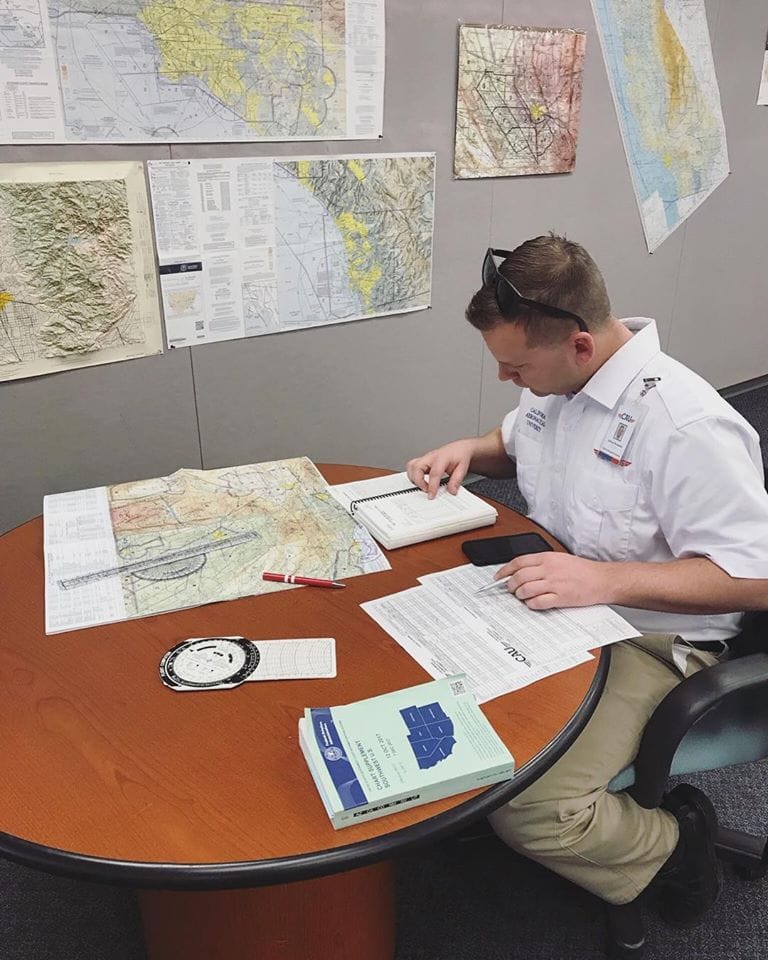Aviation is a world of its own. For new students aspiring to become pilots, starting flight training can be much like learning a brand-new language. We asked our flight instructors and Director of Flight Training to give us their tips for new students.
- Early is on time. On time is late.In the world of flying, things are always changing. From aircraft, to weather, finding a minor mechanical issue during pre-flight, or forgetting to get fuel the night before. Always show up early to each lesson. If you arrive right when the lesson is set to start, you are already behind.
- Plan as if nothing will work. Seems crazy to plan as if nothing will work in your lesson. But if you plan this way, no matter what goes wrong or what curveball the flight instructor throws at you, everything will go right as you planned. And if everything happens to work, it will be a pleasant surprise.
- Know your lesson objectives. Each flight lesson should have a written objective. Most schools (including CAU) have printed lessons with objectives, task, and completion standard. You should know exactly what your lesson is about before you show up. This will let your flight instructor spend less time teaching you on the ground, and more time in the air! More time in the air means the faster you become a pilot!
- Always learn from your mistakes; and the mistakes of others. From grade school on, we have always heard you should learn from your mistakes and push on. In aviation, this is still very much the case. In your early days of flight training, you will make mistakes. But don’t worry, your flight instructor is right beside you and will help you learn from them. Don’t forget those lesson or lessons others share with you.
- Devote time to study. Many think that becoming a pilot is mostly learning in the sky. Well, there will be a lot of flying but only about twenty-five percent of your flight training is in a plane. The majority of training is spent learning all the regulations, theaerodynamics of flight, aeromedical factors, and more. Take time each day and hit the books. You can be the best student in the plane, but without the knowledge, you will go nowhere.
- Don’t forget to eat. This seems like a no-brainer, but you would be amazed how excited you will be when it comes time to fly. Many get so excited they forget to have a meal before their lesson. Flying takes a lot of energy. Energy comes from the food we eat. You do not want to end a lesson early because you forgot to eat!
- Do not procrastinate. We see it every day. Students so caught up in flying, they forget to study along the way. Then, when it comes time to take that big FAA exam or their check-ride, they are cramming to get it done and often fail. Do yourself a favor and don’t wait until the end to study or take the exam.
- Exercise. This tip has two parts. The first deals with flying. From the start, you will be in an unpressurized aircraft going thousands of feet in the air. As you ascend, the oxygen level drops. Being in shape will allow your body to adapt for short periods to focus on the task and pilot the plane. Those who might be out of shape will find themselves becoming lightheaded quickly. Secondly, to be a professional pilot we must maintain a medical through the FAA. Poor health can lead to that medical being revoked and now, you are out of a job!
- Don’t waste time. Everyone has heard the phrase “time is money.” Flight training isn’t cheap and every minute means more money used. Work hard, study hard, and focus on every lesson. Preventing the need to retake a lesson will save you money. Once your instructor says you are ready for the exam, trust them. They have taken a few of them and they know when a student is ready! Don’t drag your feet; knock it out!
- Have fun! Flight training is very serious but a ton of fun. From flying over oceans to wide-open farmland, from peaks of mountains to sunsets at 10,000 feet. Becoming a pilot opens the doors to many things most people will never experience. Have fun during training. Embrace every aspect of aviation that you can and soon, you will be a certified pilot!
Ready to soar in your aviation career?
Mr. Matthew A. Johnston has over 23 years of experience serving various roles in education and is currently serving as the President of California Aeronautical University. He maintains memberships and is a supporting participant with several aviation promoting and advocacy associations including University Aviation Association (UAA), Regional Airline Association (RAA), AOPA, NBAA, and EAA with the Young Eagles program. He is proud of his collaboration with airlines, aviation businesses and individual aviation professionals who are working with him to develop California Aeronautical University as a leader in educating aviation professionals.
